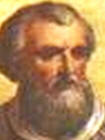 Although John IX ruled the Church for only two years, he did
much to bring order out of confusion. Had he lived longer perhaps the papacy
might have been spared some of the misery it suffered in the dark tenth century.
John IX was born in Tivoli, the son of Rampoald. He became a Benedictine monk
and a priest. After the death of Theodore II, the majority which favored that
pontiff's actions in favor of Formosus rallied around John. The other faction
tried to elect Sergius, but John prevailed. Sergius, excommunicated, had to
leave Rome.
Although John IX ruled the Church for only two years, he did
much to bring order out of confusion. Had he lived longer perhaps the papacy
might have been spared some of the misery it suffered in the dark tenth century.
John IX was born in Tivoli, the son of Rampoald. He became a Benedictine monk
and a priest. After the death of Theodore II, the majority which favored that
pontiff's actions in favor of Formosus rallied around John. The other faction
tried to elect Sergius, but John prevailed. Sergius, excommunicated, had to
leave Rome.
John at once displayed his power of organization. He held a
synod at Rome which confirmed the acts of Theodore's synod and repealed those of
the ghastly corpse-synod of Stephen VII. These were burned. Those who had been
ordained by Formosus were restored to their positions. Reordinations were
forbidden. Yet John in a spirit of moderation did not punish those who had taken
part in the corpse-synod. He accepted the excuse that they had done so under
compulsion. In the field of politics, the synod recognized as valid the
anointing of Lambert of Spoleto as emperor, and rejected that of Berenger of
North Italy. John then went to Ravenna where he held another synod in the
presence of Emperor Lambert. He had been horrified at the miserable disorder of
the country through which he passed, and he earnestly besought Lambert to keep
order in Italy. This synod echoed a decree of the Roman synod to insure order in
papal elections. The elections were to be made by the clergy with the consent of
the people and in the presence of the imperial envoys.
At this wild time imperial protection seemed desirable even at
the risk of imperial interference. But the decree was to mean nothing. No
emperor had much power; and the very next year Emperor Lambert was killed in a
hunting accident. Poor Arnulf, also a crowned emperor, was paralyzed and died
shortly after. With no emperor, the door of control of papal elections swung
open to the unbridled ambition of the nobles. John was not so lost in political
dealings that he forgot the spiritual. He pleaded with the bishops assembled at
Ravenna to give the good example so desperately needed, and to bring down God's
blessing by prayer and fasting. In spite of scolding letters from German
bishops, Pope John IX protected the Slavs from German domination. He appointed a
metropolitan and three bishops for Moravia. In the East John IX had the great
satisfaction of seeing unity and harmony prevail at Constantinople. Whether or
not there had been a second Photian schism, it was certainly over now.
John's accomplishments are amazing in view not only of the great
difficulties of the time, but of the shortness of his pontificate. Some time in
the year 900 this wise and energetic pope died.
Excerpted from "Popes
Through the Ages" by Joseph Brusher, S.J.

